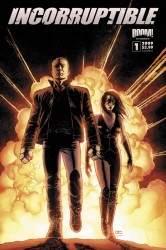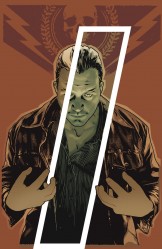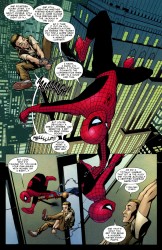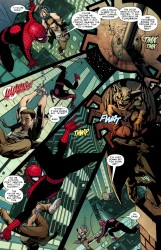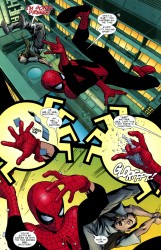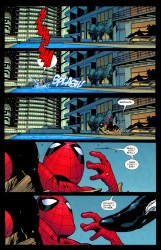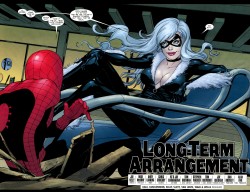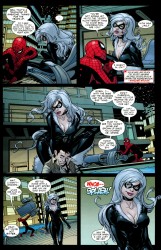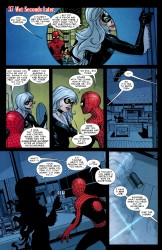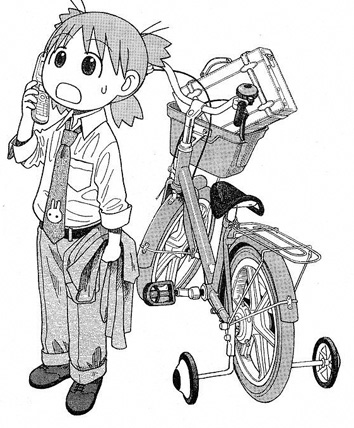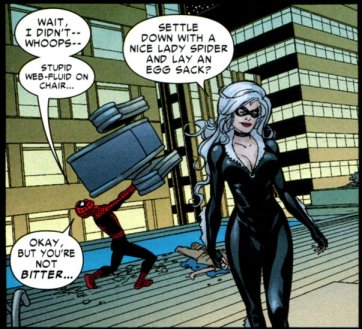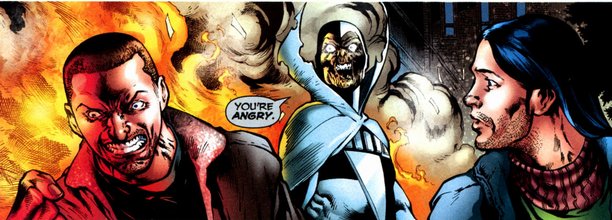Singer-actor Tyrese invents comic book superhero – CNN.com
“There was an experience that I felt was pretty limiting as far as the comic book experience itself on paper” says Gibson, who stresses that he did not grow up reading comic books and is not a comic book veteran. “[So] I set up this technology with my team and this is the first-ever digital comic book [on iTunes] in the history of comic books.”
“We don’t believe you, you need more people.”
Hey, it’s cool that you didn’t read comics growing up. My mom didn’t, either, and I’m about to ship her a big box full of books that she reads or has expressed an interest in. It’s nice you like comics now! It’s not nice that you are making things up to make Mayhem, your completely and thoroughly awful comic book, seem like something record-breaking and cool!
I don’t remember the first digital comic I got for my iPod Touch. Maybe it was some weird Japanese thing I couldn’t get to play. I do know, however, that I bought Bone: Out from Boneville, just about a year ago. Shoot, Comixology and IDW have been pumping out digital comics over the past year, Comixology in particular.
So- first ever digital comic book on iTunes: untrue. There are no amount of semantic acrobatics you can go through to make it true. It’s not the first comic book designed specifically for the iPhone/iPod Touch format. It’s not the first digital comic on iTunes. It’s not the first comic to add page turns and voiceovers. We call those “motion comics” now and both Marvel and DC have been doing them for months. It’s not even the first print comic to be transplanted to iTunes. That makes Gibson either a liar or ignorant, and if he’s ignorant, he definitely shouldn’t be making bold proclamations.
Gibson: Me and my partner Mike Lee and Will Wilson all got together, we started brainstorming about different concepts and different directions we could send this character in and we came up with something pretty unique. It’s an ongoing series and so as soon as you think you’ve got it figured out, there’s a cliffhanger that makes you want to read the second issue and the third issue.
Mayhem is a three issue series, and it’s not unique. It’s a gritty guy with a gun shooting people and grimacing. People who don’t even read comics are tired of that.
Gibson: In everything you do, there’s gonna be cynics and those folks questioning what your motivation is behind getting into anything. I dealt with it when I went from one career move to the next: “Man, stick to singing; stick to acting.”
I dealt with a lot of that from certain folks in the comic book world. … They wrote these long e-mails and [started] on a smear campaign.
That’s what we call “dry snitching,” talking about someone or something in an indirect manner so that you can seem like you didn’t talk about anyone specific at all. It’s also passive-aggressive and something children do. Gibson is talking about San Francisco comic retailer Brian Hibbs, owner of Comix Experience, one of the more respected comic book shops in the country. Hibbs wrote a post expressing reasonable skepticism about the marketing and probable value of the comic itself. And, hey, he’s a retailer, and he’s got twenty years experience in the game. I figure he knows what he’s talking about. However, his thoughts got him branded a “hater” by Gibson and his youtube sockpuppet.
It was hardly a smear campaign, by the way. It was a retailer expressing doubt, and considering that his livelihood depends on being able to sell comics, he has every right to do so.
Gibson proclaims his newfound love for comics throughout the piece, but it’s always tilted toward “I want people to buy my comic.” He never mentions comics that he enjoys. He only mentions other creators when they are related, tangentially or no, to his book. He speaks of Mayhem going to other media, like movies, after building a comic book fanbase. He positions himself as an innovator, rather than someone who helped create a retrograde and ugly comic book of the sort we’d left back in 1996.
Gibson’s own marketing director, Percy “MF Grimm” Carey, quit the project while citing their “snake oil selling marketing tactics.” Carey’s dissent is important, as his book Sentences, featuring art by Ron Wimberly, was released from a very well-regarded imprint from one of the two biggest comic publishers around. It was critically and commercially well-received, and gained Carey a measure of respect in the comic book world, mainly because he gets it. You have to show and prove before people buy into your hype. You can’t do it in reverse. You can’t hype and expect people to let you spoon feed them baby food.
When you factor in Carey’s reasons for quitting, the Mayhem situation suddenly becomes very clear. It’s a cash-in, a quick attempt to trade Tyrese’s fame for sales of an amateurish comic book about a walking, talking cliche in a cliche of a story fighting cliche villains. You’ve read Mayhem several times before, and it was undoubtedly better every other time.
Mayhem is the dictionary definition of a soft batch: undercooked, underplanned, and falls to pieces if you look at it hard. But hey, don’t take my word for it. Here’s five pages from the first issue and the solicit for issue #1.
Los Angeles, the City of Fallen Angels, is a city swept up by a brutal crime wave led by a kingpin known only as Big X. The body count builds as only one man can stop the flow of drugs and violence, only one man can stop Big X. He is the embodiment of vengeance and raw justice, the faceless arm of those who cannot defend themselves. He is known as Mayhem, and along with his sexy but deadly partner Malice, their goal is to dismantle the kingpin’s organization, unravel the dark secret that mysteriously links them to Big X, and save the city they grew up in.







